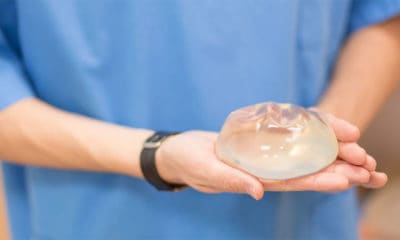Vaginal rejuvenation has stepped out of the shadows and entered the plastic surgery spotlight. Women who are not comfortable with the appearance of their vaginas are speaking up and having something done about it. Every year more and more women are choosing to undergo labiaplasty to improve the appearance and function of their most private parts.
“The problems that prompt women to have labiaplasty are no more common now than they were previously,” points out Long Island plastic surgeon Dr. Mark D. Epstein. “But there’s a greater awareness. Women are paying more attention to how they look in that area, and they want to feel more comfortable.”
Labia 101
Every woman has two sets of genital folds, also referred to as genital lips. The outer lips, known as the labia majora, are the large folds of skin that form the outer border of the female genitalia. The inner lips, known as the labia minora, are much smaller and thinner. These are the delicate lips that surround the vaginal opening.
In many women, the labia minora are not easily visible because they are hidden by the labia majora. In some cases, however, the labia minora are enlarged and extend beyond the outer lips. When the labia minora are enlarged or lengthened, it can cause women physical discomfort in clothing or while they are physically active. It can also make a woman feel self-conscious during sex, detracting from her self-esteem.
If your vaginal lips are bothering you to the point where they interfere with your daily life, making you self-conscious or causing you physical discomfort, you may be a good candidate for labiaplasty.
What is Labiaplasty?
During labiaplasty, the labia minora are surgically reshaped and excess tissue is removed. There is no “cookie cutter” gold standard for labiaplasty. The shape of your labia will be determined during the planning process with your plastic surgeon based on your personal preference.
While labiaplasty is most commonly done under general anesthesia, it can also be done safely under local anesthesia. “There is no reason why the patient can’t be awake during the procedure if they are comfortable with that,” says Epstein. “The local anesthesia only takes about fifteen seconds to put in, and the procedure takes a little over an hour. Once the patient is numb, there’s really nothing uncomfortable about the procedure at all.”
Labiaplasty is an outpatient procedure, meaning the patient goes home the same day they have the surgery done. The recovery period is short. In fact, Epstein’s labiaplasty patients typically return to work the very next day.
One Day Recovery with Exparel
The local anesthesia traditionally used during labiaplasty surgery, Marcaine, wears off several hours after the patient returns home. Until recently, the discomfort women experienced once the numbness wore off meant they needed to lay low for a few days before returning to normal life.
Thanks to a newer, longer lasting anesthetic drug called Exparel, the recovery process has become shorter and much less painful for labiaplasty patients. “Exparel lasts three to four days,” explains Epstein. “Our patients after labiaplasty experience no discomfort from the time they wake up, for the next several days. They’re able to return to their normal activities much, much quicker.”
One of Epstein’s own employees recently underwent a breast reduction and labiaplasty, and returned to work the very next day.
No Sex for Six Weeks
While you may return to work as soon as the next day, it’s important to give your vagina a rest as it continues to heal. The area will be tender and swollen in the days and weeks following surgery. Aftercare is minimal and involves the application of an antibiotic ointment for several days to prevent infection and wearing a thick maxi pad as a dressing for the wound. “We’re repairing very delicate tissues, with very fine sutures,” points out Epstein.
None of the following for six weeks after surgery:
- Sex
- Motorcycles
- Bicycles
- Horseback riding
For Epstein’s patients, these restrictions have never been a deal-breaker. When the area is fully healed and no longer tender to the touch, all restrictions on activity are lifted.
“Patients are so happy with the way they look, that the six weeks just fly by,” concludes Epstein.


















Facebook
Twitter
Instagram
YouTube
RSS